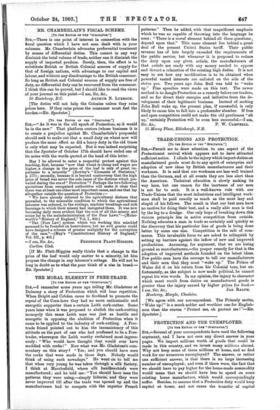[To THE EDITOR OF THE "SPECTATOR."] Sin,—" As it was
in the old epoch of Protection, so it would be in the new." That platform orators (whose business it is to create a prejudice against Mr. Chamberlain's proposals) should seek to make out that a small duty on wheat now will produce the same effect as did a heavy duty in the old times is only what may be expected. But it was indeed surprising that the Spectator of October 17th should have ended one of its notes with the words quoted at the head of this letter.
May I be allowed to enter a respectful protest against this teaching, first, because "now that wheat is cheap and wages are higher, a change in the price of the loaf is only of great im- portance to a minority" (Bowley's "Elements of Statistics," p. 177) ; secondly, because it is beyond controversy that the high price of bread was never the sole cause of the distress which pre- vailed during the era of "Protection"? Perhaps the two following quotations from recognised authorities will make it clear that there was at least one other most important cause, and one that lay altogether outside the question of Protection :—
" We have already referred to the agricultural distress that prevailed, to the miserable condition to which the agricultural labourer was reduced, to the riotings, machine breakings and rick burnings to which their misery had instigated them. It was now becoming daily more evident that the root of all this misery and crime lay in the maladministration of the Poor Laws."—(Moles- worth's "History of England," Vol. I., 309.) "The [Poor Law] system which was working this mischief assumed to be founded on benevolence, but no evil genius could have designed a scheme of greater malignity for the corruption of the race."—(May's "Constitutional History of England," Vol. III., p. 405.) Carlton Club. am, Sir, &c., FREDERICK PLATT-HIGGINB.
[If Mr. Platt-Higgins really thinks that a change in the price of the loaf would only matter to a minority, let him propose the change in any labourer's cottage. He will not be long in doubt as to what the poor think of a rise in bread.— ED. Spectator.]






















































 Previous page
Previous page